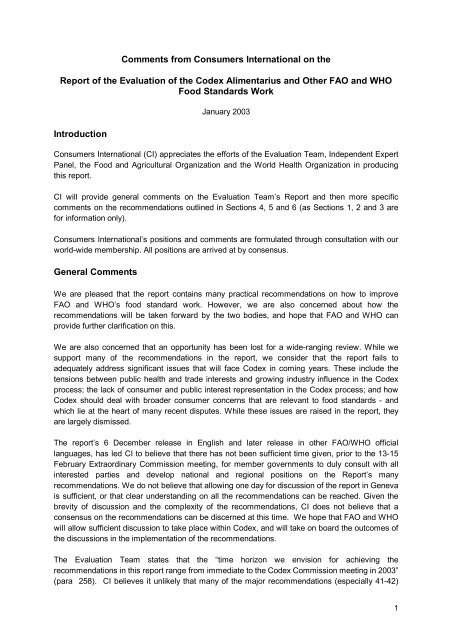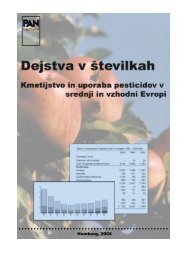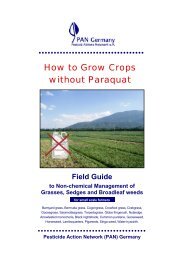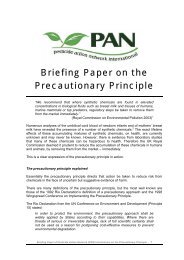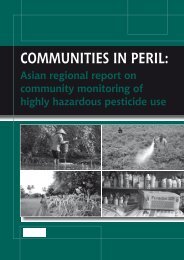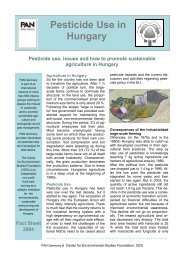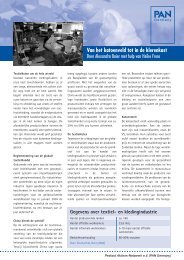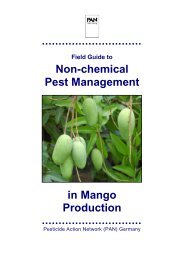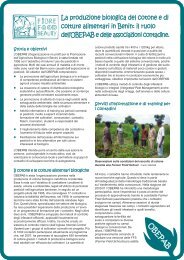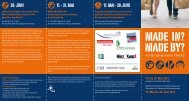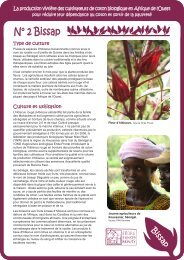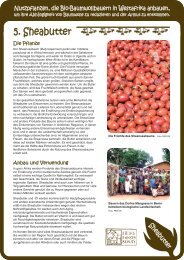Comments from Consumers International on the Report of the ...
Comments from Consumers International on the Report of the ...
Comments from Consumers International on the Report of the ...
Create successful ePaper yourself
Turn your PDF publications into a flip-book with our unique Google optimized e-Paper software.
<str<strong>on</strong>g>Comments</str<strong>on</strong>g> <str<strong>on</strong>g>from</str<strong>on</strong>g> <str<strong>on</strong>g>C<strong>on</strong>sumers</str<strong>on</strong>g> <str<strong>on</strong>g>Internati<strong>on</strong>al</str<strong>on</strong>g> <strong>on</strong> <strong>the</strong><br />
<strong>Report</strong> <strong>of</strong> <strong>the</strong> Evaluati<strong>on</strong> <strong>of</strong> <strong>the</strong> Codex Alimentarius and O<strong>the</strong>r FAO and WHO<br />
Food Standards Work<br />
Introducti<strong>on</strong><br />
January 2003<br />
<str<strong>on</strong>g>C<strong>on</strong>sumers</str<strong>on</strong>g> <str<strong>on</strong>g>Internati<strong>on</strong>al</str<strong>on</strong>g> (CI) appreciates <strong>the</strong> efforts <strong>of</strong> <strong>the</strong> Evaluati<strong>on</strong> Team, Independent Expert<br />
Panel, <strong>the</strong> Food and Agricultural Organizati<strong>on</strong> and <strong>the</strong> World Health Organizati<strong>on</strong> in producing<br />
this report.<br />
CI will provide general comments <strong>on</strong> <strong>the</strong> Evaluati<strong>on</strong> Team’s <strong>Report</strong> and <strong>the</strong>n more specific<br />
comments <strong>on</strong> <strong>the</strong> recommendati<strong>on</strong>s outlined in Secti<strong>on</strong>s 4, 5 and 6 (as Secti<strong>on</strong>s 1, 2 and 3 are<br />
for informati<strong>on</strong> <strong>on</strong>ly).<br />
<str<strong>on</strong>g>C<strong>on</strong>sumers</str<strong>on</strong>g> <str<strong>on</strong>g>Internati<strong>on</strong>al</str<strong>on</strong>g>’s positi<strong>on</strong>s and comments are formulated through c<strong>on</strong>sultati<strong>on</strong> with our<br />
world-wide membership. All positi<strong>on</strong>s are arrived at by c<strong>on</strong>sensus.<br />
General <str<strong>on</strong>g>Comments</str<strong>on</strong>g><br />
We are pleased that <strong>the</strong> report c<strong>on</strong>tains many practical recommendati<strong>on</strong>s <strong>on</strong> how to improve<br />
FAO and WHO’s food standard work. However, we are also c<strong>on</strong>cerned about how <strong>the</strong><br />
recommendati<strong>on</strong>s will be taken forward by <strong>the</strong> two bodies, and hope that FAO and WHO can<br />
provide fur<strong>the</strong>r clarificati<strong>on</strong> <strong>on</strong> this.<br />
We are also c<strong>on</strong>cerned that an opportunity has been lost for a wide-ranging review. While we<br />
support many <strong>of</strong> <strong>the</strong> recommendati<strong>on</strong>s in <strong>the</strong> report, we c<strong>on</strong>sider that <strong>the</strong> report fails to<br />
adequately address significant issues that will face Codex in coming years. These include <strong>the</strong><br />
tensi<strong>on</strong>s between public health and trade interests and growing industry influence in <strong>the</strong> Codex<br />
process; <strong>the</strong> lack <strong>of</strong> c<strong>on</strong>sumer and public interest representati<strong>on</strong> in <strong>the</strong> Codex process; and how<br />
Codex should deal with broader c<strong>on</strong>sumer c<strong>on</strong>cerns that are relevant to food standards - and<br />
which lie at <strong>the</strong> heart <strong>of</strong> many recent disputes. While <strong>the</strong>se issues are raised in <strong>the</strong> report, <strong>the</strong>y<br />
are largely dismissed.<br />
The report’s 6 December release in English and later release in o<strong>the</strong>r FAO/WHO <strong>of</strong>ficial<br />
languages, has led CI to believe that <strong>the</strong>re has not been sufficient time given, prior to <strong>the</strong> 13-15<br />
February Extraordinary Commissi<strong>on</strong> meeting, for member governments to duly c<strong>on</strong>sult with all<br />
interested parties and develop nati<strong>on</strong>al and regi<strong>on</strong>al positi<strong>on</strong>s <strong>on</strong> <strong>the</strong> <strong>Report</strong>’s many<br />
recommendati<strong>on</strong>s. We do not believe that allowing <strong>on</strong>e day for discussi<strong>on</strong> <strong>of</strong> <strong>the</strong> report in Geneva<br />
is sufficient, or that clear understanding <strong>on</strong> all <strong>the</strong> recommendati<strong>on</strong>s can be reached. Given <strong>the</strong><br />
brevity <strong>of</strong> discussi<strong>on</strong> and <strong>the</strong> complexity <strong>of</strong> <strong>the</strong> recommendati<strong>on</strong>s, CI does not believe that a<br />
c<strong>on</strong>sensus <strong>on</strong> <strong>the</strong> recommendati<strong>on</strong>s can be discerned at this time. We hope that FAO and WHO<br />
will allow sufficient discussi<strong>on</strong> to take place within Codex, and will take <strong>on</strong> board <strong>the</strong> outcomes <strong>of</strong><br />
<strong>the</strong> discussi<strong>on</strong>s in <strong>the</strong> implementati<strong>on</strong> <strong>of</strong> <strong>the</strong> recommendati<strong>on</strong>s.<br />
The Evaluati<strong>on</strong> Team states that <strong>the</strong> “time horiz<strong>on</strong> we envisi<strong>on</strong> for achieving <strong>the</strong><br />
recommendati<strong>on</strong>s in this report range <str<strong>on</strong>g>from</str<strong>on</strong>g> immediate to <strong>the</strong> Codex Commissi<strong>on</strong> meeting in 2003”<br />
(para 258). CI believes it unlikely that many <strong>of</strong> <strong>the</strong> major recommendati<strong>on</strong>s (especially 41-42)<br />
1
c<strong>on</strong>cerning technical assistance to implement and enforce standards to protect c<strong>on</strong>sumer health<br />
can be achieved within that time frame. Hence, CI recommends that <strong>the</strong> Commissi<strong>on</strong> takes no<br />
decisi<strong>on</strong>s <strong>on</strong> <strong>the</strong> <strong>Report</strong> at <strong>the</strong> February sessi<strong>on</strong>, but instead engage in a thorough discussi<strong>on</strong> <strong>of</strong><br />
<strong>the</strong> <strong>Report</strong> in preparati<strong>on</strong> before beginning to take decisi<strong>on</strong>s <strong>on</strong> <strong>the</strong> recommendati<strong>on</strong>s at <strong>the</strong> 30<br />
June-5 July meeting <strong>of</strong> <strong>the</strong> Commissi<strong>on</strong>.<br />
To foster discussi<strong>on</strong>, CI recommends that <strong>the</strong> Commissi<strong>on</strong> c<strong>on</strong>siders asking <strong>the</strong> Secretariat to<br />
invite members and observers to participate in three m<strong>on</strong>th l<strong>on</strong>g electr<strong>on</strong>ic forums that would<br />
fur<strong>the</strong>r discuss <strong>the</strong> report and its recommendati<strong>on</strong>s, perhaps per <strong>Report</strong> secti<strong>on</strong>s. The<br />
Secretariat would provide a summary <strong>of</strong> <strong>the</strong>se discussi<strong>on</strong>s prior to <strong>the</strong> 30 June – 7 July<br />
Commissi<strong>on</strong> meeting. CI also hopes that <strong>the</strong> papers listed in <strong>the</strong> report’s bibliography will be<br />
posted <strong>on</strong> <strong>the</strong> Codex Web site, so that members and observers can better appreciate <strong>the</strong><br />
background <strong>of</strong> <strong>the</strong> recommendati<strong>on</strong>s.<br />
Protecting <strong>the</strong> Integrity <strong>of</strong> <strong>the</strong> Codex System<br />
The percepti<strong>on</strong> that Codex standards are based <strong>on</strong> sound science (as well as o<strong>the</strong>r legitimate<br />
factors) and independent <strong>of</strong> <strong>the</strong> interests <strong>of</strong> particular governments or ec<strong>on</strong>omic sectors is critical<br />
to <strong>the</strong>ir acceptance as internati<strong>on</strong>al benchmarks. Codex standards are generally held in high<br />
regard by most <strong>of</strong> <strong>the</strong> world's governments and trusted by most sectors that are aware <strong>of</strong> <strong>the</strong>m.<br />
However, that c<strong>on</strong>fidence is fragile, and if trust is lost, it is not easily regained.<br />
CI is c<strong>on</strong>cerned that <strong>the</strong> integrity <strong>of</strong> Codex is threatened, and sees two trends that pose risks. We<br />
urge <strong>the</strong> Commissi<strong>on</strong> to pro-actively m<strong>on</strong>itor and manage <strong>the</strong>se risks, and not to ignore <strong>the</strong>m.<br />
The first trend is that interests o<strong>the</strong>r than public health and c<strong>on</strong>sumer protecti<strong>on</strong>, which have<br />
always been present, have grown more prominent in recent years and could eventually come to<br />
have unacceptable and prep<strong>on</strong>derant influence over Codex deliberati<strong>on</strong>s.<br />
This first trend results <str<strong>on</strong>g>from</str<strong>on</strong>g> <strong>the</strong> tendency am<strong>on</strong>g governments to view standards primarily in terms<br />
<strong>of</strong> trade facilitati<strong>on</strong>, ra<strong>the</strong>r than towards integrating standards to protect health. CI has observed<br />
many occasi<strong>on</strong>s in recent years in Codex in which nati<strong>on</strong>al positi<strong>on</strong>s, and sometimes <strong>the</strong><br />
outcome <strong>of</strong> Codex deliberati<strong>on</strong>s, were driven by trade interests more than by science and food<br />
safety c<strong>on</strong>cerns. To some extent this is inevitable. However, members need to agree that<br />
generally <strong>the</strong>ir business at Codex is public health and c<strong>on</strong>sumer protecti<strong>on</strong>, and that <strong>the</strong>y should<br />
settle <strong>the</strong>ir trade disputes in o<strong>the</strong>r, more appropriate fora.<br />
The sec<strong>on</strong>d trend that poses a potential threat to <strong>the</strong> integrity <strong>of</strong> <strong>the</strong> Codex system is <strong>the</strong> evergrowing<br />
agenda <strong>of</strong> work, in <strong>the</strong> face <strong>of</strong> fixed or shrinking budgets. The Evaluati<strong>on</strong> <strong>Report</strong><br />
recommends reforms (as well as expansi<strong>on</strong> <strong>of</strong> Codex standards-setting activity into new areas)<br />
that it estimates would cost several milli<strong>on</strong> dollars a year to implement. CI is c<strong>on</strong>cerned about<br />
where this m<strong>on</strong>ey would come <str<strong>on</strong>g>from</str<strong>on</strong>g>, and believes that <strong>the</strong> integrity <strong>of</strong> Codex could be adversely<br />
affected by <strong>the</strong> sources <strong>of</strong> <strong>the</strong> funds.<br />
For example, <strong>the</strong> Evaluati<strong>on</strong> Team, recommends fundraising to expand <strong>the</strong> risk assessment work<br />
<strong>of</strong> Codex. The report urges that serious c<strong>on</strong>siderati<strong>on</strong> be given to whe<strong>the</strong>r industry should be<br />
asked to pay for risk assessments <strong>of</strong> (proprietary) chemicals, which would include pesticides,<br />
food additives and veterinary drugs under <strong>the</strong> current structure, and packaging materials and<br />
processing aids under <strong>the</strong> Evaluati<strong>on</strong> Team's new, expanded recommended structure. While <strong>the</strong><br />
Evaluati<strong>on</strong> Team says it is c<strong>on</strong>fident that "fire walls" could be erected to prevent any influence<br />
2
over results <strong>of</strong> risk assessments paid for by <strong>the</strong> interested companies, <strong>the</strong> basis for that<br />
c<strong>on</strong>fidence is anything but transparent, and CI is sceptical. The external percepti<strong>on</strong> <strong>of</strong> Codex<br />
would be negatively altered if industry funding is widely accepted within <strong>the</strong> standard-setting<br />
process, particularly at a time when <strong>the</strong>re is already a percepti<strong>on</strong> that industry interests have<br />
undue influence.<br />
As a sec<strong>on</strong>d example, CI notes with c<strong>on</strong>cern <strong>the</strong> growing role <strong>of</strong> internati<strong>on</strong>al food industry<br />
organisati<strong>on</strong>s, such as ILSI, in efforts to build food safety capacity in developing countries. We<br />
welcome <strong>the</strong> very informative report <strong>on</strong> capacity building activities, prepared by <strong>the</strong> Codex<br />
Secretariat for <strong>the</strong> recent series <strong>of</strong> regi<strong>on</strong>al Codex Committees. According to that report, food<br />
industry organisati<strong>on</strong>s co-sp<strong>on</strong>sored all <strong>of</strong> <strong>the</strong> cited training workshops in <strong>the</strong> Asia regi<strong>on</strong>, and<br />
several in <strong>the</strong> Latin American regi<strong>on</strong> as well. Co-sp<strong>on</strong>sorship <strong>of</strong> events affords <strong>the</strong> sp<strong>on</strong>sors<br />
some influence over <strong>the</strong> agenda and participants <strong>of</strong> <strong>the</strong> events. We note that n<strong>on</strong>e <strong>of</strong> <strong>the</strong><br />
described capacity-building events seems to have focused <strong>on</strong> c<strong>on</strong>sumer c<strong>on</strong>cerns or roles. As a<br />
result, it seems likely that participants received incomplete or unbalanced perspectives <strong>on</strong> some<br />
issues <strong>on</strong> which <strong>the</strong>re are divergent points <strong>of</strong> view. It appears to CI that industry involvement in<br />
capacity-building has grown rapidly, and without sufficient discussi<strong>on</strong> by <strong>the</strong> Commissi<strong>on</strong> as to<br />
whe<strong>the</strong>r and to what extent such a role for industry is appropriate and acceptable.<br />
CI is not opposed to public-private partnerships, under <strong>the</strong> right c<strong>on</strong>diti<strong>on</strong>s, and recognises <strong>the</strong><br />
major resp<strong>on</strong>sibility industry has for food safety. However, we would like to ensure that such<br />
partnerships are open and transparent within <strong>the</strong> Codex system, and that <strong>the</strong>y do not result in<br />
industry having an undue influence over internati<strong>on</strong>al food safety policies. CI str<strong>on</strong>gly urges <strong>the</strong><br />
Commissi<strong>on</strong> to examine this trend and issue appropriate advice to FAO and WHO. We hope <strong>the</strong><br />
Commissi<strong>on</strong> will take a str<strong>on</strong>g and principled positi<strong>on</strong> that ranks <strong>the</strong> integrity <strong>of</strong> Codex as <strong>the</strong><br />
most important value in <strong>the</strong> system.<br />
We are fur<strong>the</strong>r c<strong>on</strong>cerned that if capacity building activities to provide technical assistance to<br />
implement and enforce standards remain greatly underfunded while <strong>the</strong> standards setting<br />
process is accelerated, <strong>the</strong> standards will serve primarily to facilitate trade and not to protect<br />
c<strong>on</strong>sumer health. As <strong>the</strong> Evaluati<strong>on</strong> notes, “standards do not protect c<strong>on</strong>sumers unless <strong>the</strong>y are<br />
enforced through a properly functi<strong>on</strong>ing food c<strong>on</strong>trol system” (paragraph 14). The current lack <strong>of</strong><br />
political will to finance technical assistance for <strong>the</strong> implementati<strong>on</strong> and enforcement <strong>of</strong> standards<br />
in <strong>the</strong> majority <strong>of</strong> Codex members erodes <strong>the</strong> effect <strong>of</strong> <strong>the</strong> standards and <strong>the</strong>ir credibility, a vital<br />
foundati<strong>on</strong> <strong>of</strong> Codex’s integrity.<br />
Preserving Democracy While Improving Efficiency<br />
CI is generally supportive <strong>of</strong> <strong>the</strong> goals <strong>of</strong> improving <strong>the</strong> efficiency <strong>of</strong> <strong>the</strong> Codex process and<br />
enhancing participati<strong>on</strong>, particularly <strong>of</strong> developing countries. We are c<strong>on</strong>cerned, however, that<br />
<strong>the</strong>se two objectives are occasi<strong>on</strong>ally at odds with each o<strong>the</strong>r. We note with approval that many<br />
<strong>of</strong> <strong>the</strong> specific recommendati<strong>on</strong>s <strong>of</strong> <strong>the</strong> Evaluati<strong>on</strong> <strong>Report</strong> are aimed at making <strong>the</strong> Codex<br />
process more inclusive, and expanding access to <strong>the</strong> process for developing-country members.<br />
At <strong>the</strong> same time, however, we believe that several <strong>of</strong> <strong>the</strong> key recommendati<strong>on</strong>s, if implemented<br />
as c<strong>on</strong>ceived by <strong>the</strong> Evaluati<strong>on</strong> Team, would tend to reduce participati<strong>on</strong> and make <strong>the</strong> process<br />
less transparent. For example:<br />
• The creati<strong>on</strong> <strong>of</strong> two new bodies, <strong>the</strong> Executive Board and <strong>the</strong> Standards management<br />
Committee, would expand <strong>the</strong> number <strong>of</strong> meetings and impose greater demands <strong>on</strong> <strong>the</strong><br />
resources <strong>of</strong> governments and observers seeking to participate effectively.<br />
3
• Reliance <strong>on</strong> c<strong>on</strong>sultants to revise drafts and facilitate inter-sessi<strong>on</strong> working groups would give<br />
even greater influence over <strong>the</strong> results <strong>of</strong> Codex work to <strong>the</strong> small number <strong>of</strong> countries that<br />
host committees (who would engage and pay <strong>the</strong> c<strong>on</strong>sultants).<br />
• Reducti<strong>on</strong> <strong>of</strong> <strong>the</strong> step process <str<strong>on</strong>g>from</str<strong>on</strong>g> eight steps to five would reduce time for members and<br />
observers to c<strong>on</strong>sider proposals and make inputs, and could reduce <strong>the</strong> depth and breadth <strong>of</strong><br />
c<strong>on</strong>sensus achievable.<br />
• Abbreviati<strong>on</strong> <strong>of</strong> meeting reports, to focus <strong>on</strong>ly <strong>on</strong> decisi<strong>on</strong>s taken and eliminate discussi<strong>on</strong>s<br />
and negotiati<strong>on</strong>s leading to agreements, would greatly reduce <strong>the</strong> transparency <strong>of</strong> decisi<strong>on</strong>s<br />
and place at a disadvantage those governments and observers (i.e., <strong>the</strong> majority) that were<br />
unable to be present at <strong>the</strong> meetings <strong>the</strong>mselves.<br />
CI believes that <strong>the</strong> current relatively low level <strong>of</strong> effective participati<strong>on</strong> by developing countries<br />
and dominance <strong>of</strong> developed-country perspectives in its work products are problems that <strong>the</strong><br />
Codex system needs to overcome, and urges <strong>the</strong> Commissi<strong>on</strong>, FAO and WHO to give particular<br />
c<strong>on</strong>siderati<strong>on</strong> to avoiding exacerbating <strong>the</strong>se problems through reforms aimed at efficiency. We<br />
also note that observers, especially c<strong>on</strong>sumer observers, face serious resource c<strong>on</strong>straints and<br />
are already stretched too thin to keep up with <strong>the</strong> expanding agenda <strong>of</strong> important topics Codex is<br />
addressing. While we all would like Codex to become more efficient, CI believes that doing so by<br />
becoming less inclusive and less deliberative would be too high a cost to pay.<br />
Secti<strong>on</strong> 4: Evaluati<strong>on</strong> and Recommendati<strong>on</strong>s for Codex<br />
4.3 Findings and proposals <strong>on</strong> <strong>the</strong> usefulness <strong>of</strong> Codex, prioritisati<strong>on</strong>, scope <strong>of</strong> work and<br />
mandate<br />
4.3.2 Scope and prioritisati<strong>on</strong> <strong>of</strong> Codex work<br />
We agree as set out in Recommendati<strong>on</strong> 1 that Codex should fully cover health-related aspects<br />
<strong>of</strong> food standards, but regard <strong>the</strong> bulleted items in <strong>the</strong> recommendati<strong>on</strong> as an indicative list,<br />
ra<strong>the</strong>r than an exhaustive list <strong>of</strong> “health related aspects <strong>of</strong> food standards. However, we are<br />
c<strong>on</strong>cerned that <strong>the</strong> evaluati<strong>on</strong> has not proposed fur<strong>the</strong>r broadening <strong>of</strong> Codex's remit. As stated, it<br />
is increasingly recognised that <strong>the</strong> most effective way to ensure effective food safety and<br />
standards is to take a plough to plate/ farm to fork approach. Codex's ability to do this is currently<br />
limited.<br />
CI disagrees with Recommendati<strong>on</strong> 2 that Codex should not take <strong>on</strong> additi<strong>on</strong>al work in n<strong>on</strong>-health<br />
related areas. There are three main reas<strong>on</strong>s for our oppositi<strong>on</strong>. First, <strong>the</strong> recommendati<strong>on</strong>, as<br />
stated, entails cessati<strong>on</strong> <strong>of</strong> work <strong>on</strong> food quality and <strong>the</strong> many aspects <strong>of</strong> commodity standards<br />
that have no public health c<strong>on</strong>sequences. If <strong>the</strong> Commissi<strong>on</strong> adopts Recommendati<strong>on</strong> 2, it will<br />
be in c<strong>on</strong>tradicti<strong>on</strong> to part <strong>of</strong> Recommendati<strong>on</strong> 3. Sec<strong>on</strong>d, as noted in <strong>the</strong> FAO management<br />
resp<strong>on</strong>se (ALINORM 03/25/3 – Add.1, paragraph 7), Codex cannot cease to work <strong>on</strong> n<strong>on</strong>-health<br />
related issues and still carry out <strong>the</strong> legitimate objectives <strong>of</strong> <strong>the</strong> Agreement <strong>on</strong> Technical Barriers<br />
to Trade, including “preventi<strong>on</strong> <strong>of</strong> deceptive practices” (Article 2.2) that informati<strong>on</strong> labelling can<br />
help to remedy.<br />
Thirdly CI questi<strong>on</strong>s <strong>the</strong> Evaluati<strong>on</strong> report's categorical disjuncti<strong>on</strong> <strong>of</strong> health and n<strong>on</strong>-health<br />
related issues, particularly as <strong>the</strong>y are characterised in Boxes 1 and 2. The report suggests that<br />
a clear distincti<strong>on</strong> can always be made between 'science-based' and 'n<strong>on</strong>-science based'<br />
standards. In some situati<strong>on</strong>s, <strong>the</strong> science behind science-based standards may be limited by<br />
data gaps and uncertainties, and <strong>the</strong>refore assumpti<strong>on</strong>s and judgements have been, and will be,<br />
4
used when setting standards. Similarly, o<strong>the</strong>r standards, including commodity standards, but also<br />
standards relating to c<strong>on</strong>sumer informati<strong>on</strong> or labelling, for example, may have a scientific<br />
element. It is important that this is recognised.<br />
Reference is made to <strong>the</strong> Codex Committee <strong>on</strong> Food Labelling's work <strong>on</strong> labelling <strong>of</strong> foods<br />
derived <str<strong>on</strong>g>from</str<strong>on</strong>g> modern biotechnology. It is suggested that 'this particular issue reflects a broader<br />
difficulty in internati<strong>on</strong>al harm<strong>on</strong>isati<strong>on</strong> when cultural differences am<strong>on</strong>g countries mean that<br />
c<strong>on</strong>sumers have different interests and priorities'. We disagree with this asserti<strong>on</strong>. Our<br />
experience is in fact <strong>the</strong> reverse - <str<strong>on</strong>g>from</str<strong>on</strong>g> c<strong>on</strong>sultati<strong>on</strong> with our membership around <strong>the</strong> world,<br />
c<strong>on</strong>sumer opini<strong>on</strong> is united in favour <strong>of</strong> comprehensive labelling. The issue has however<br />
highlighted <strong>the</strong> influence <strong>of</strong> political and ec<strong>on</strong>omic c<strong>on</strong>siderati<strong>on</strong>s over Codex standards.<br />
<str<strong>on</strong>g>C<strong>on</strong>sumers</str<strong>on</strong>g> <str<strong>on</strong>g>Internati<strong>on</strong>al</str<strong>on</strong>g> understands that c<strong>on</strong>sensus <strong>on</strong> issues such as GM labelling has been<br />
blocked, not due to ‘cultural differences’ but due to multinati<strong>on</strong>al business interests and a few<br />
governments preventing acti<strong>on</strong> <strong>on</strong> a matter <strong>of</strong> vital c<strong>on</strong>cern to <strong>the</strong> world’s c<strong>on</strong>sumers.<br />
We agree that c<strong>on</strong>sumer health and safety should be <strong>the</strong> over-riding priority <strong>of</strong> Codex<br />
(Recommendati<strong>on</strong> 3). We also agree with <strong>the</strong> need to prioritise commodity standards. However<br />
we are c<strong>on</strong>cerned about <strong>the</strong> low ranking given to 'informati<strong>on</strong>al labelling relating to n<strong>on</strong>-health<br />
and n<strong>on</strong>-safety issues'. This work is just as important for c<strong>on</strong>sumers in developing countries as<br />
developed <strong>on</strong>es. By relegating “informati<strong>on</strong>al labelling relating to n<strong>on</strong>-health and n<strong>on</strong>-safety<br />
issues” to <strong>the</strong> fourth priority <strong>of</strong> Recommendati<strong>on</strong> 3, <strong>the</strong> Commissi<strong>on</strong> would have to presume that<br />
scientific investigati<strong>on</strong> is always able to determine what is and isn’t a health-related issue. This<br />
presumpti<strong>on</strong> may lead to decisi<strong>on</strong>s that endanger c<strong>on</strong>sumer health, particularly given <strong>the</strong> lack <strong>of</strong><br />
priority within Codex <strong>on</strong> advising governments <strong>on</strong> risk communicati<strong>on</strong> and implementati<strong>on</strong> and<br />
enforcement guidance c<strong>on</strong>cerning standards.<br />
Fur<strong>the</strong>rmore, through labelling, c<strong>on</strong>sumers can effectively participate in risk management.<br />
Labelling also enhances <strong>the</strong> transparency and accountability <strong>of</strong> Codex and <strong>the</strong> stakeholders<br />
involved. Unless <strong>the</strong>re is a more c<strong>on</strong>vincing reas<strong>on</strong>ing for this low ranking, we str<strong>on</strong>gly believe<br />
that this task should be embodied str<strong>on</strong>gly and emphasised as a norm in all Codex standards and<br />
texts.<br />
<str<strong>on</strong>g>C<strong>on</strong>sumers</str<strong>on</strong>g> <str<strong>on</strong>g>Internati<strong>on</strong>al</str<strong>on</strong>g> <strong>the</strong>refore suggests <strong>the</strong> following re-ordering and re-formulati<strong>on</strong> <strong>of</strong><br />
priorities listed in Recommendati<strong>on</strong> 3:<br />
1) standards having an impact <strong>on</strong> c<strong>on</strong>sumer health and safety;<br />
2) standards and informati<strong>on</strong>al labelling relating to n<strong>on</strong>-health and n<strong>on</strong>-safety issues (but which<br />
have an impact <strong>on</strong> o<strong>the</strong>r aspects <strong>of</strong> c<strong>on</strong>sumer protecti<strong>on</strong>, e.g. preventing deceptive practices);<br />
3) n<strong>on</strong>-health related aspects <strong>of</strong> commodity standards with those resp<strong>on</strong>ding to <strong>the</strong> expressed<br />
needs <strong>of</strong> developing countries taking precedence over those resp<strong>on</strong>ding to needs <strong>of</strong> developed<br />
countries<br />
4.3.3 A clear mandate for Codex<br />
<str<strong>on</strong>g>C<strong>on</strong>sumers</str<strong>on</strong>g> <str<strong>on</strong>g>Internati<strong>on</strong>al</str<strong>on</strong>g> would appreciate a clear explanati<strong>on</strong> for <strong>the</strong> need for a “formal<br />
mandate”. If <strong>the</strong> present statutes are regarded as inadequate <strong>the</strong>n we would generally agree with<br />
<strong>the</strong> proposed mandate in Recommendati<strong>on</strong> 4 . However, we suggest amending <strong>the</strong> proposed<br />
mandate as follows (change in italics): 'The formulati<strong>on</strong> and revisi<strong>on</strong> <strong>of</strong> internati<strong>on</strong>al standards for<br />
food, in collaborati<strong>on</strong> with o<strong>the</strong>r appropriate internati<strong>on</strong>al intergovernmental organisati<strong>on</strong>s, with<br />
priority to standards for <strong>the</strong> protecti<strong>on</strong> <strong>of</strong> c<strong>on</strong>sumer health and for <strong>the</strong> protecti<strong>on</strong> <strong>of</strong> c<strong>on</strong>sumers<br />
5
against unfair practices in <strong>the</strong> food marketplace, while taking into full account <strong>the</strong> needs <strong>of</strong><br />
developing countries.'<br />
Moreover, It is important that Codex puts public health first in <strong>the</strong> whole way that it approaches its<br />
work, not merely in <strong>the</strong> way that it prioritises which standards to work <strong>on</strong>. For example, it serves<br />
little purpose to prioritise work <strong>on</strong> a standard if <strong>the</strong> development <strong>of</strong> that standard is not <strong>the</strong>n<br />
subsequently carried out with public health as a priority. We would also appreciate a<br />
recommendati<strong>on</strong> <str<strong>on</strong>g>from</str<strong>on</strong>g> <strong>the</strong> evaluati<strong>on</strong> as to how this mandate would be achieved in <strong>the</strong> present<br />
c<strong>on</strong>text <strong>of</strong> Codex noting <strong>the</strong> great infiltrati<strong>on</strong> and influence by industry and trade interests.<br />
We support <strong>the</strong> need for FAO and WHO to define how formal recommendati<strong>on</strong>s <strong>of</strong> Codex should<br />
be brought to <strong>the</strong> attenti<strong>on</strong> <strong>of</strong> FAO/WHO governing bodies (Recommendati<strong>on</strong> 5).<br />
4.3.4 WTO and Codex<br />
We do not agree with Recommendati<strong>on</strong> 6. It is our view that Codex's work <strong>on</strong> developing<br />
guidelines for risk analysis will in effect set out how an 'acceptable level <strong>of</strong> protecti<strong>on</strong>' (ALOP)<br />
should be achieved. We do not believe that it is possible to come up with generic guidance <strong>on</strong><br />
what is an ALOP as this will depend <strong>on</strong> <strong>the</strong> particular issue c<strong>on</strong>cerned, and many o<strong>the</strong>r factors,<br />
including for example possible benefits or availability <strong>of</strong> alternatives.<br />
We also do not c<strong>on</strong>sider that it is Codex's role to 'reduce <strong>the</strong> scope <strong>of</strong> disputes in <strong>the</strong> WTO'.<br />
Although Codex is referenced in <strong>the</strong> WTO agreements, it is - and should remain - an independent<br />
organisati<strong>on</strong>.<br />
4.4 Reform <strong>of</strong> Codex<br />
4.4.1 Degree <strong>of</strong> independence <strong>of</strong> Codex<br />
We fully support Recommendati<strong>on</strong> 7 that 'Codex should remain within FAO and WHO but should<br />
have more independence, authority and resp<strong>on</strong>sibility over priority setting and management <strong>of</strong> its<br />
work programme'. However, we believe that close cooperati<strong>on</strong> and collaborati<strong>on</strong> with FAO and<br />
WHO should be maintained with regards to capacity building in order to enforce standards for <strong>the</strong><br />
protecti<strong>on</strong> <strong>of</strong> c<strong>on</strong>sumer health.<br />
4.4.2 Links to OIE and IPPC<br />
We agree that ‘food safety has become a food chain issue’ (paragraph 88). So has <strong>the</strong> ability to<br />
provide c<strong>on</strong>sumers with informed food choices about what <strong>the</strong>y are eating, as c<strong>on</strong>sumers are<br />
increasingly interested in <strong>the</strong> origin <strong>of</strong> <strong>the</strong>ir food and <strong>the</strong> methods used to produce it. We agree<br />
that if Codex were to be created <str<strong>on</strong>g>from</str<strong>on</strong>g> scratch (paragraph 88), it would need to have a remit to<br />
look at issues across <strong>the</strong> entire food chain as <strong>the</strong>y impact <strong>on</strong> food safety and c<strong>on</strong>sumer<br />
protecti<strong>on</strong>. This should still be <strong>the</strong> aim although we appreciate <strong>the</strong> resource implicati<strong>on</strong>s.<br />
We do not think that this food chain approach should be lost as an ultimate goal, but agree that in<br />
<strong>the</strong> interim, greater and more effective collaborati<strong>on</strong> and co-operati<strong>on</strong> between Codex and o<strong>the</strong>r<br />
relevant organisati<strong>on</strong>s, such as <strong>the</strong> OIE and IPPC is desirable. The relati<strong>on</strong>ship between Codex<br />
and <strong>the</strong>se organisati<strong>on</strong>s needs to be formalised. We think that <strong>the</strong> idea <strong>of</strong> joint task forces with<br />
<strong>the</strong> OIE for example is a good <strong>on</strong>e. We <strong>the</strong>refore agree with Recommendati<strong>on</strong> 8 that Codex and<br />
OIE should intensify <strong>the</strong>ir collaborati<strong>on</strong> to minimise overlaps and avoid gaps in standards setting<br />
6
and that <strong>the</strong>re should be close collaborati<strong>on</strong> between Codex and IPPC. We recommend that<br />
adequate measures are taken to ensure that c<strong>on</strong>sumer participati<strong>on</strong> and transparency are not<br />
diminished in <strong>the</strong>se collaborati<strong>on</strong>s.<br />
4.4.3 Findings and recommendati<strong>on</strong>s for Codex organisati<strong>on</strong> and procedures<br />
4.4.3.1 Administrative procedures<br />
The Evaluati<strong>on</strong> Team reports that some informants in developed countries believed that “Codex<br />
must be run like a business.” CI believes that if Codex adopts recommendati<strong>on</strong>s to prioritise <strong>the</strong><br />
protecti<strong>on</strong> <strong>of</strong> c<strong>on</strong>sumer health, <strong>the</strong>n Codex should be run more like a public health organisati<strong>on</strong>.<br />
A more public health oriented Codex would include public health representatives <strong>on</strong> any new<br />
bodies that might result <str<strong>on</strong>g>from</str<strong>on</strong>g> <strong>the</strong> Commissi<strong>on</strong>’s deliberati<strong>on</strong>s <strong>on</strong> Recommendati<strong>on</strong>s 9-12.<br />
Inclusi<strong>on</strong> <strong>of</strong> such representatives would be desirable for many reas<strong>on</strong>s, particularly given <strong>the</strong><br />
recommendati<strong>on</strong> to prioritise work <strong>on</strong> health claims made for foods in Recommendati<strong>on</strong> 1.<br />
CI believes that <strong>the</strong> Commissi<strong>on</strong> should c<strong>on</strong>sider Recommendati<strong>on</strong>s 9-12 c<strong>on</strong>jointly, because<br />
support by many members and observers for Recommendati<strong>on</strong>s 9-10 will likely depend <strong>on</strong> <strong>the</strong><br />
remit and compositi<strong>on</strong> <strong>of</strong> <strong>the</strong> proposed Standards Management Committee (SMC), <strong>the</strong><br />
compositi<strong>on</strong> and remit <strong>of</strong> which remains to be determined.<br />
We have been in favour <strong>of</strong> annual Codex Commissi<strong>on</strong> meetings in order to speed up Codex's<br />
work (Recommendati<strong>on</strong> 12). While we have welcomed proposals to make <strong>the</strong> Executive<br />
Committee more transparent, we have been uncertain about its c<strong>on</strong>tinuing role. We welcome <strong>the</strong><br />
intenti<strong>on</strong> behind <strong>the</strong> recommendati<strong>on</strong> that an Executive Board is set up in place <strong>of</strong> <strong>the</strong> Executive<br />
Committee (Recommendati<strong>on</strong> 9). However, we have some c<strong>on</strong>cerns about <strong>the</strong> implicati<strong>on</strong>s for<br />
transparency and <strong>the</strong> c<strong>on</strong>sensual way in which Codex works. If such a Board is to be established,<br />
its functi<strong>on</strong> should be mainly to deal with managerial issues. We have c<strong>on</strong>cerns about how such a<br />
body could be sufficiently accountable, representative and transparent given its small<br />
membership, to deal with strategic issues, including Codex's work plan.<br />
We welcome <strong>the</strong> proposal that if such a Board is set up it should have observer participati<strong>on</strong><br />
(Recommendati<strong>on</strong> 10), but have c<strong>on</strong>cerns about how <strong>the</strong> observers would be appointed, given<br />
that such participati<strong>on</strong> would be limited. There is <strong>the</strong> danger that <strong>the</strong>se observers could become<br />
tokenistic and we would like clarificati<strong>on</strong> as to how <strong>the</strong>ir accountability and representativeness<br />
would be ensured. We also suggest that if a Board is set up, it should hold its meetings in public.<br />
We have similar c<strong>on</strong>cerns about <strong>the</strong> proposal to establish a Standards Management Committee<br />
(Recommendati<strong>on</strong> 11). According to <strong>the</strong> brief descripti<strong>on</strong> <strong>of</strong> <strong>the</strong> SMC in <strong>the</strong> Evaluati<strong>on</strong> <strong>Report</strong>,<br />
<strong>the</strong> SMC would be <strong>the</strong> most powerful committee in Codex, so its compositi<strong>on</strong>, its relati<strong>on</strong> to an<br />
Executive Board and Secretariat, and <strong>the</strong> standard setting process (as described in Figure 4) will<br />
all need to be more carefully reviewed. While we appreciate that <strong>the</strong> SMC would make <strong>the</strong><br />
process quicker and more efficient, <strong>the</strong>re is <strong>the</strong> danger that many members <strong>of</strong> Codex, and<br />
observers, would be excluded <str<strong>on</strong>g>from</str<strong>on</strong>g> critical decisi<strong>on</strong>s. In <strong>the</strong> event that <strong>the</strong> Commissi<strong>on</strong><br />
recommends <strong>the</strong> creati<strong>on</strong> <strong>of</strong> <strong>the</strong> SMC, CI proposes that compositi<strong>on</strong> <strong>of</strong> that committee include<br />
observer representatives, including a representative <str<strong>on</strong>g>from</str<strong>on</strong>g> c<strong>on</strong>sumer organisati<strong>on</strong>s. We also<br />
support <strong>the</strong> idea <strong>of</strong> having a formal mechanism that brings <strong>the</strong> chairs <strong>of</strong> <strong>the</strong> different Codex<br />
committees toge<strong>the</strong>r.<br />
7
We are also c<strong>on</strong>cerned <strong>of</strong> <strong>the</strong> extra costs associated with establishing an Executive Board and a<br />
Standards Management Committee as this would create at least two additi<strong>on</strong>al meetings per<br />
year. We should bear in mind that this may fur<strong>the</strong>r stretch <strong>the</strong> limited resources for effective<br />
participati<strong>on</strong>.<br />
4.4.3.2 The Codex secretariat<br />
We agree that <strong>the</strong> Codex secretariat should be able to carry out managerial, strategic and<br />
communicati<strong>on</strong> functi<strong>on</strong>s and that <strong>the</strong> overall seniority <strong>of</strong> <strong>the</strong> secretariat staff should also be<br />
raised (Recommendati<strong>on</strong> 13).<br />
We also agree that <strong>the</strong> secretariat should become a separate FAO unit (Recommendati<strong>on</strong> 14).<br />
However, we also c<strong>on</strong>sider it essential that <strong>the</strong> WHO plays a much greater role as part <strong>of</strong> <strong>the</strong><br />
secretariat as well as more generally in relati<strong>on</strong> to Codex, reflecting its over-riding objective to<br />
protect public health. We also agree with <strong>the</strong> Evaluati<strong>on</strong> Team that WHO employed Codex staff<br />
should be Geneva-based.<br />
We urge <strong>the</strong> Commissi<strong>on</strong> to support Recommendati<strong>on</strong> 15 - if Codex is to become more effective,<br />
efficient and resp<strong>on</strong>sive to developments in <strong>the</strong> food chain, it will need to have a well-resourced,<br />
pro-active secretariat. CI urges governments to increase <strong>the</strong>ir c<strong>on</strong>tributi<strong>on</strong>s to <strong>the</strong> regular<br />
budgets <strong>of</strong> FAO and WHO so that funding <strong>of</strong> <strong>the</strong> Secretariat not depend <strong>on</strong> extra-budgetary<br />
sources and sec<strong>on</strong>dments <strong>of</strong> staff <str<strong>on</strong>g>from</str<strong>on</strong>g> governments.<br />
Regarding <strong>the</strong> proposal to outsource translati<strong>on</strong>s (paragraph 106), CI suggests that <strong>the</strong><br />
Secretariat attempts to arrange with FAO and WHO for <strong>the</strong> appointment <strong>of</strong> translators and<br />
interpreters who would be dedicated to Codex work. While gains in <strong>the</strong> speed and efficiency <strong>of</strong><br />
translati<strong>on</strong> services might be gained through outsourcing, <strong>the</strong> quality <strong>of</strong> translati<strong>on</strong>s, l<strong>on</strong>g a matter<br />
<strong>of</strong> criticism at Codex meetings, can be best remedied through arranging to have translators<br />
whose first priority is Codex work.<br />
4.4.3.3 General Subject and Commodity Committees<br />
We agree that in some cases <strong>the</strong>re has been a lack <strong>of</strong> clarity over <strong>the</strong> work carried out by<br />
different committees. We support <strong>the</strong> proposal (Recommendati<strong>on</strong> 16) for Codex to undertake a<br />
review <strong>of</strong> <strong>the</strong> work <strong>of</strong> <strong>the</strong> general subject and commodity committees in order to rati<strong>on</strong>alise. We<br />
also support <strong>the</strong> idea <strong>of</strong> commodity work being handled by time-bound task-forces, and a move<br />
towards more focused and specialised agendas.<br />
4.4.3.4 Codex Regi<strong>on</strong>al Structure and <strong>the</strong> Regi<strong>on</strong>al Committees<br />
We agree that Codex should carry out a review <strong>of</strong> <strong>the</strong> mandate and work <strong>of</strong> regi<strong>on</strong>al committees<br />
within <strong>the</strong> next two years (Recommendati<strong>on</strong> 17), but we do think that <strong>the</strong> regi<strong>on</strong>al committees<br />
<strong>of</strong>ten fulfil an important functi<strong>on</strong>. Some regi<strong>on</strong>al committees (Committee for North America and<br />
<strong>the</strong> South West Pacific, and Committee for Latin America and <strong>the</strong> Caribbean) are developing a<br />
strategic plan. CI recommends that all <strong>the</strong> regi<strong>on</strong>al committees c<strong>on</strong>sider doing this in order to<br />
clarify and sharpen <strong>the</strong>ir purpose and functi<strong>on</strong>ing.<br />
We also believe it would be useful to make <strong>the</strong> committees specific to Codex ra<strong>the</strong>r than<br />
FAO/WHO regi<strong>on</strong>al committees which suggests that <strong>the</strong>y are outside <strong>the</strong> Codex process.<br />
8
For our comments <strong>on</strong> encouraging regi<strong>on</strong>al groupings <strong>of</strong> countries, please see secti<strong>on</strong> 4.4.3.8.<br />
4.4.3.5 A clearer definiti<strong>on</strong> <strong>of</strong> committee and task force working procedures<br />
We agree that it would be helpful if all committee and task force work was time-bound<br />
(Recommendati<strong>on</strong> 18). However, it is important that this does not undermine c<strong>on</strong>sensus - a vote<br />
should be avoided as it is unacceptable to have internati<strong>on</strong>al standards decided <strong>on</strong> such a basis.<br />
In practice, it will be useful to set time-limits, but <strong>the</strong>se should be regularly reviewed.<br />
Implementati<strong>on</strong> <strong>of</strong> Recommendati<strong>on</strong> 19 should seek to make operati<strong>on</strong>al in <strong>the</strong> standard setting<br />
process <strong>the</strong> principles <strong>on</strong> risk analysis, including risk communicati<strong>on</strong>, that have been developed<br />
in <strong>the</strong> Committee <strong>on</strong> General Principles, following <strong>the</strong>ir adopti<strong>on</strong> by <strong>the</strong> Commissi<strong>on</strong>. We agree<br />
that <strong>the</strong>re has <strong>of</strong>ten been delay because risk assessment has dominated discussi<strong>on</strong>s within<br />
Codex committees. It is important to strive for as clear a separati<strong>on</strong> <strong>of</strong> <strong>the</strong> risk assessment and<br />
risk management functi<strong>on</strong>s as possible (Recommendati<strong>on</strong> 19). However, a certain amount <strong>of</strong><br />
interacti<strong>on</strong> will be not <strong>on</strong>ly inevitable but necessary. While Codex Committees in <strong>the</strong>ir risk<br />
management role, should not try to do <strong>the</strong> risk assessment, it is legitimate that <strong>the</strong>y are involved<br />
in <strong>the</strong> risk assessment policy stage. It is also important to recognise that <strong>the</strong>re is a certain amount<br />
<strong>of</strong> judgement involved in risk assessment, and <strong>the</strong> outcome can depend <strong>on</strong> a number <strong>of</strong> factors<br />
including <strong>the</strong> adequacy <strong>of</strong> <strong>the</strong> evidence c<strong>on</strong>sidered, <strong>the</strong> way that uncertainty is dealt with, any<br />
assumpti<strong>on</strong>s that are made, and <strong>the</strong> scientists involved <strong>on</strong> <strong>the</strong> committee and <strong>the</strong>ir own particular<br />
experience, expertise and interests. It is <strong>the</strong>refore legitimate for delegati<strong>on</strong>s at Codex Committees<br />
to questi<strong>on</strong> <strong>the</strong> results <strong>of</strong> a risk assessment - <strong>the</strong>y are not set in st<strong>on</strong>e. We note that effective risk<br />
communicati<strong>on</strong> is not limited to “effective communicati<strong>on</strong> (and trust) between risk managers and<br />
assessors” (paragraph 119) – see our comments <strong>on</strong> Secti<strong>on</strong> 4.5, “Communicati<strong>on</strong>”.<br />
CI thinks it is sensible to increase work in standards development between sessi<strong>on</strong>s in order to<br />
reduce <strong>the</strong> amount <strong>of</strong> standards writing in meetings, provided that <strong>the</strong>re are adequate resources<br />
for all members and observers to participate in inter-sessi<strong>on</strong>al standards development.<br />
(Recommendati<strong>on</strong> 20). However, we are c<strong>on</strong>cerned that <strong>the</strong> recommendati<strong>on</strong>s for <strong>the</strong> use <strong>of</strong><br />
c<strong>on</strong>sultants, ra<strong>the</strong>r than inter-sessi<strong>on</strong>al workshops, as <strong>the</strong> primary means for development <strong>of</strong><br />
standards may result in <strong>the</strong> development <strong>of</strong> standards in <strong>the</strong> interest <strong>of</strong> <strong>the</strong> host counties who can<br />
afford <strong>the</strong> c<strong>on</strong>sultants, since “<strong>the</strong> cost <strong>of</strong> c<strong>on</strong>sultants/facilitators would have to be borne by host<br />
countries” (paragraph 124). CI is not c<strong>on</strong>vinced that individual c<strong>on</strong>sultants “can more fully<br />
represent all members views” (paragraph 122) than an inter-sessi<strong>on</strong>al workshop that takes into<br />
account all written comments <str<strong>on</strong>g>from</str<strong>on</strong>g> members and observers. We are c<strong>on</strong>cerned that <strong>the</strong> benefits<br />
<strong>of</strong> increased efficiency cannot be made without sacrificing openness/transparency/participati<strong>on</strong>.<br />
If <strong>the</strong> Commissi<strong>on</strong> decides that electr<strong>on</strong>ically facilitated workshops can better ensure <strong>the</strong><br />
opportunity for fuller inter-sessi<strong>on</strong>al participati<strong>on</strong> in standards development, CI recommends that<br />
<strong>the</strong> Commissi<strong>on</strong> c<strong>on</strong>sider establishing a joint FAO/WHO communicati<strong>on</strong>s equipment fund and<br />
project.<br />
It is also proposed to make ‘greater use <strong>of</strong> knowledgeable NGOs in preliminary standard<br />
development’. Implementati<strong>on</strong> <strong>of</strong> this recommendati<strong>on</strong> could result in a c<strong>on</strong>flict <strong>of</strong> interest and<br />
have implicati<strong>on</strong>s for <strong>the</strong> credibility <strong>of</strong> Codex work, particularly if <strong>the</strong> c<strong>on</strong>sultant drafting <strong>the</strong><br />
preliminary standard and <strong>the</strong> c<strong>on</strong>sultant/facilitator hired to manage c<strong>on</strong>sensus <strong>on</strong> a standard are<br />
<str<strong>on</strong>g>from</str<strong>on</strong>g> <strong>the</strong> same country or observer group. In practice, <strong>the</strong> NGOs who are most likely to have <strong>the</strong><br />
resources to participate in such a way will be those representing industry, which could<br />
compromise <strong>the</strong> need for Codex to put public health first. CI believes that before <strong>the</strong> Commissi<strong>on</strong><br />
c<strong>on</strong>siders whe<strong>the</strong>r to authorise a policy <strong>of</strong> using NGOs to draft preliminary standards, it should<br />
9
agree <strong>on</strong> criteria to minimise c<strong>on</strong>flicts <strong>of</strong> interest similar to what has been proposed for scientists<br />
chosen for Joint Expert bodies.<br />
We agree that reports <strong>of</strong> meetings should be more acti<strong>on</strong> oriented (Recommendati<strong>on</strong> 21), but<br />
also c<strong>on</strong>sider it important to have discussi<strong>on</strong>s accurately minuted. Observers and governments<br />
without <strong>the</strong> resources to participate in <strong>the</strong> current schedule <strong>of</strong> Codex meetings, or any increase <strong>of</strong><br />
meetings that may result <str<strong>on</strong>g>from</str<strong>on</strong>g> an accelerated standard setting process, will find <strong>the</strong>mselves at<br />
great disadvantage if <strong>the</strong> Secretariat reports to all members and observers <strong>on</strong>ly decisi<strong>on</strong>s taken<br />
and not <strong>the</strong> c<strong>on</strong>text in which those decisi<strong>on</strong>s were made. CI believes that <strong>the</strong> transparency <strong>of</strong> <strong>the</strong><br />
Codex decisi<strong>on</strong> making process would be affected if <strong>the</strong> negotiating history is omitted <str<strong>on</strong>g>from</str<strong>on</strong>g><br />
reports. We suggest that <strong>the</strong> additi<strong>on</strong>al resources proposed for <strong>the</strong> secretariat include minutetakers<br />
who can write up <strong>the</strong> report as <strong>the</strong> meeting progresses.<br />
The role <strong>of</strong> <strong>the</strong> chair is key to making successful progress. We <strong>the</strong>refore agree that criteria for<br />
selecti<strong>on</strong> <strong>of</strong> chairs should be drawn up by <strong>the</strong> Executive Committee (or its successor) and that<br />
more emphasis should be placed <strong>on</strong> training and assessment <strong>of</strong> chairs and <strong>the</strong> explicit role <strong>of</strong> <strong>the</strong><br />
secretariat in supporting <strong>the</strong> chair (Recommendati<strong>on</strong> 22). As guidance <strong>on</strong> chairing Codex<br />
meetings may not suffice to prevent bad chairing practices, CI believes that <strong>the</strong> Commissi<strong>on</strong><br />
should authorise <strong>the</strong> Executive Committee, or a task force, to draft a list <strong>of</strong> principles or practices<br />
<strong>of</strong> chairpers<strong>on</strong>ship and warnings and sancti<strong>on</strong>s for violati<strong>on</strong>s <strong>of</strong> those principles, e.g. declarati<strong>on</strong><br />
<strong>of</strong> c<strong>on</strong>sensus where <strong>the</strong>re is c<strong>on</strong>siderable dissent.<br />
We had hoped that <strong>the</strong> Evaluati<strong>on</strong> would have given greater c<strong>on</strong>siderati<strong>on</strong> to delegati<strong>on</strong>s<br />
attending meetings. We agree that steps should be taken to tighten checks <strong>on</strong> <strong>the</strong> credentials <strong>of</strong><br />
members <strong>of</strong> delegati<strong>on</strong>s and to be more transparent about <strong>the</strong> interests that <strong>the</strong>y represent. For<br />
example, it is difficult to distinguish between government representatives and interest groups <strong>on</strong><br />
some delegati<strong>on</strong>s.<br />
4.4.3.6 The Step Procedure<br />
CI believes that <strong>the</strong> proposed reducti<strong>on</strong> <strong>of</strong> <strong>the</strong> existing eight Step Procedure to five steps<br />
(Recommendati<strong>on</strong> 23) needs to be understood in <strong>the</strong> c<strong>on</strong>text <strong>of</strong> <strong>the</strong> recommended changes in<br />
standards management, including <strong>the</strong> creati<strong>on</strong> <strong>of</strong> <strong>the</strong> Standards Management Committee and <strong>the</strong><br />
reduced role <strong>of</strong> committees in drafting standards. Because we have many unanswered questi<strong>on</strong>s<br />
about <strong>the</strong> relati<strong>on</strong> between <strong>the</strong> recommended Step Procedure and <strong>the</strong> proposed changes in<br />
standards management (see Figure 4), CI takes no positi<strong>on</strong> <strong>on</strong> Recommendati<strong>on</strong> 23. CI<br />
recommends that <strong>the</strong> Commissi<strong>on</strong> take no acti<strong>on</strong> <strong>on</strong> this proposal at <strong>the</strong> Extraordinary<br />
Commissi<strong>on</strong> meeting. We look forward to <strong>the</strong> Commissi<strong>on</strong>’s discussi<strong>on</strong> <strong>of</strong> <strong>the</strong>se standards<br />
management proposals and how <strong>the</strong> proposed five Step Procedure <strong>of</strong>fers greater opportunity<br />
than <strong>the</strong> eight Step Procedure for due deliberati<strong>on</strong> <strong>of</strong> standards to protect c<strong>on</strong>sumer health.<br />
4.4.3.7 C<strong>on</strong>sensus building and decisi<strong>on</strong>-making<br />
CI is c<strong>on</strong>cerned by <strong>the</strong> definiti<strong>on</strong> <strong>of</strong> c<strong>on</strong>sensus proposed in Recommendati<strong>on</strong> 24 (''no formal<br />
objecti<strong>on</strong> by more than <strong>on</strong>e member present at <strong>the</strong> meeting'”), and we do not understand <strong>the</strong><br />
rati<strong>on</strong>ale behind <strong>the</strong> proposed number. We believe that <strong>the</strong> Commissi<strong>on</strong> should ask <strong>the</strong> Codex<br />
Committee <strong>on</strong> General Principles to ga<strong>the</strong>r experiences and definiti<strong>on</strong>s <strong>of</strong> c<strong>on</strong>sensus used by<br />
o<strong>the</strong>r intergovernmental bodies. Clear guidelines for chairs should also be developed <strong>on</strong> <strong>the</strong><br />
meaning <strong>of</strong> c<strong>on</strong>sensus, and decisi<strong>on</strong>-making in <strong>the</strong> absence <strong>of</strong> c<strong>on</strong>sensus. Training should be<br />
given to chairs <strong>on</strong> how to work towards c<strong>on</strong>sensus.<br />
10
We also have c<strong>on</strong>cerns as already expressed about <strong>the</strong> roles envisaged for <strong>the</strong> Executive Board<br />
and <strong>the</strong> Standards Management Committee, given <strong>the</strong>ir limited and selective membership, but<br />
huge influence over <strong>the</strong> adopti<strong>on</strong> <strong>of</strong> standards.<br />
Although observers do not have <strong>the</strong> right to vote, CI supports in principle <strong>the</strong> idea <strong>of</strong> a<br />
“c<strong>on</strong>sultative postal balloting system” in <strong>the</strong> event that c<strong>on</strong>sensus cannot be achieved <strong>on</strong> a<br />
standard in Committees (Recommendati<strong>on</strong> 24). CI is c<strong>on</strong>cerned, however, that members who<br />
are not able to participate in a Committee meeting and who will not have <strong>the</strong> Secretariat’s report<br />
<strong>of</strong> <strong>the</strong> discussi<strong>on</strong>s <strong>on</strong> <strong>the</strong> standard if Recommendati<strong>on</strong> 21 is adopted will simply become <strong>the</strong><br />
lobbying targets <strong>of</strong> members and observers with resources to lobby. To minimise <strong>the</strong> impact <strong>of</strong><br />
lobbying efforts <strong>on</strong> n<strong>on</strong>-participating members, <strong>the</strong> Secretariat should ensure rapid finalisati<strong>on</strong> <strong>of</strong><br />
its reporting <strong>on</strong> <strong>the</strong> standard in questi<strong>on</strong>, so that n<strong>on</strong>-participating members could vote<br />
electr<strong>on</strong>ically within 10 working days following <strong>the</strong> adjournment <strong>of</strong> a Committee sessi<strong>on</strong>.<br />
However, CI would like to emphasise that we believe voting should <strong>on</strong>ly be used as a last resort<br />
as this idea works against c<strong>on</strong>sensus.<br />
4.4.3.8 Greater influence in Codex decisi<strong>on</strong> making for developing countries<br />
We recognise <strong>the</strong> benefits that sub-regi<strong>on</strong>al groupings <strong>of</strong> countries with similar interests and<br />
problems would have for greater inclusiveness in Codex (Recommendati<strong>on</strong> 25), particularly <strong>of</strong><br />
developing countries. In situati<strong>on</strong>s where countries would normally have been absent <str<strong>on</strong>g>from</str<strong>on</strong>g><br />
Codex meetings, such groupings would allow an opportunity to still be represented to a certain<br />
extent and have a voice.<br />
However, we are c<strong>on</strong>cerned that proxy arrangements and procedures centred <strong>on</strong> ‘ec<strong>on</strong>omically<br />
and geographically coherent groups’ could encourage “bloc” resp<strong>on</strong>ses to issues and intensify<br />
regi<strong>on</strong>al divisiveness in Codex. It is important to c<strong>on</strong>sider <strong>the</strong> impact that <strong>the</strong> proposal could have<br />
<strong>on</strong> <strong>the</strong> promoti<strong>on</strong> <strong>of</strong> trade interests over public health within Codex. We have some c<strong>on</strong>cerns that<br />
greater emphasis <strong>on</strong> <strong>the</strong> development <strong>of</strong> a series <strong>of</strong> regi<strong>on</strong>al groups could slow down <strong>the</strong> Codex<br />
process if trade c<strong>on</strong>cerns are played out within meetings. We are also c<strong>on</strong>cerned about how<br />
‘positi<strong>on</strong>s <strong>of</strong> <strong>the</strong> group’ will be formulated, and how a transparent democratic decisi<strong>on</strong>-making<br />
process within groups will be ensured.<br />
However, in light <strong>of</strong> <strong>the</strong> potentially significant c<strong>on</strong>tributi<strong>on</strong> to participati<strong>on</strong> CI can support<br />
Recommendati<strong>on</strong> 25 if our c<strong>on</strong>cerns above are addressed.<br />
We agree that host countries should be encouraged to appoint co-chairs <str<strong>on</strong>g>from</str<strong>on</strong>g> a developed and<br />
developing country (Recommendati<strong>on</strong> 26).<br />
4.4.3.9 Transparency and <strong>the</strong> participati<strong>on</strong> <strong>of</strong> n<strong>on</strong>-governmental organisati<strong>on</strong>s in Codex<br />
CI has c<strong>on</strong>sistently held <strong>the</strong> view that c<strong>on</strong>sumer interests are far out-weighed by industrial<br />
interests both explicitly and implicitly within <strong>the</strong> Codex process. In <strong>the</strong> coming years c<strong>on</strong>sumer<br />
participati<strong>on</strong> in Codex will likely decline as <strong>the</strong> agenda <strong>of</strong> Codex expands and our finite resources<br />
are spread thinner. We believe that assuring at least <strong>the</strong> existing level <strong>of</strong> c<strong>on</strong>sumer participati<strong>on</strong><br />
in Codex is essential to maintain <strong>the</strong> legitimacy <strong>of</strong> <strong>the</strong> standard-setting process. We had hoped<br />
that <strong>the</strong> Evaluati<strong>on</strong> could have proposed steps that could be taken to ensure c<strong>on</strong>tinued – and<br />
enhanced - c<strong>on</strong>sumer participati<strong>on</strong>. We believe that <strong>the</strong>se include:<br />
11
- making c<strong>on</strong>sumer participati<strong>on</strong> at <strong>the</strong> nati<strong>on</strong>al and internati<strong>on</strong>al levels in <strong>the</strong> Codex<br />
process a benchmark requirement for participati<strong>on</strong> in <strong>the</strong> Codex Trust Fund and<br />
Project, and o<strong>the</strong>r Food Standards Programmes;<br />
- effectively using c<strong>on</strong>sumer organisati<strong>on</strong>s’ and independent reports <strong>on</strong> c<strong>on</strong>sumers’<br />
participati<strong>on</strong> for decisi<strong>on</strong> making at Codex;<br />
- ensuring and facilitating balanced nati<strong>on</strong>al delegati<strong>on</strong>s;<br />
- publishing an annual or bi-annual compendium <strong>of</strong> reports <strong>on</strong> c<strong>on</strong>sumer participati<strong>on</strong> at<br />
nati<strong>on</strong>al, regi<strong>on</strong>al and internati<strong>on</strong>al Codex meetings and workshops;<br />
- taking affirmative acti<strong>on</strong> such as making special efforts to include c<strong>on</strong>sumers’<br />
participati<strong>on</strong> in Codex capacity building initiatives.<br />
We questi<strong>on</strong> <strong>the</strong> need for Recommendati<strong>on</strong> 27 that <strong>the</strong> principles and procedures for granting<br />
observer status need to be reviewed. In light <strong>of</strong> <strong>the</strong> fact that CCGP completed just such a review<br />
within <strong>the</strong> past two or three years, repeating this work may not be a priority. However, CI<br />
believes that <strong>the</strong> interests different groups represent should be made more transparent as this is<br />
not always obvious <str<strong>on</strong>g>from</str<strong>on</strong>g> <strong>the</strong> name <strong>of</strong> <strong>the</strong> organisati<strong>on</strong>.<br />
4.4.3.10 Role and resp<strong>on</strong>sibilities <strong>of</strong> host countries<br />
We agree with Recommendati<strong>on</strong> 28 - clear criteria to be met in becoming a host country should<br />
be developed. Am<strong>on</strong>g <strong>the</strong>se criteria should be a commitment to remind members that <strong>the</strong>ir<br />
nati<strong>on</strong>al Codex C<strong>on</strong>tact Points or Committees should maintain a data base <str<strong>on</strong>g>from</str<strong>on</strong>g> which to invite<br />
written comments and public meeting participati<strong>on</strong> to deliberate nati<strong>on</strong>al or regi<strong>on</strong>al positi<strong>on</strong>s for<br />
<strong>the</strong> committee or task force hosted or co-hosted by a member.<br />
4.5 Communicati<strong>on</strong><br />
CI is disappointed with <strong>the</strong> Evaluati<strong>on</strong> <strong>Report</strong>’s brief secti<strong>on</strong> <strong>on</strong> Communicati<strong>on</strong>. It regards<br />
communicati<strong>on</strong> as a <strong>on</strong>e-way process through which “insiders” (food safety experts and Codex<br />
participants) explain hazards and decisi<strong>on</strong>s to <strong>the</strong> public. In fact, communicati<strong>on</strong> (or “Risk<br />
Communicati<strong>on</strong>,” in risk analysis terminology) is an integral part <strong>of</strong> <strong>the</strong> entire process. It is an<br />
interactive process that ensures, am<strong>on</strong>g o<strong>the</strong>r things, effective participati<strong>on</strong> <strong>of</strong> and exchange <strong>of</strong><br />
informati<strong>on</strong> am<strong>on</strong>g all appropriate actors at various stages <strong>of</strong> a risk analysis. If communicati<strong>on</strong><br />
elements are not well-designed and executed, <strong>the</strong> results <strong>of</strong> risk analysis may be flawed and <strong>the</strong>ir<br />
acceptability to governments or <strong>the</strong> public may be undermined. CI <strong>the</strong>refore believes that WHO,<br />
FAO and <strong>the</strong> Commissi<strong>on</strong> need to give much greater priority—far greater than is evident in <strong>the</strong><br />
evaluati<strong>on</strong> report—to ensuring that risk communicati<strong>on</strong> is a robust element <strong>of</strong> Codex risk analysis,<br />
and that it occurs within a carefully planned overall strategy.<br />
We do not agree with <strong>the</strong> Evaluati<strong>on</strong> <strong>Report</strong>’s view that risk assessors should be <strong>the</strong> <strong>on</strong>es to<br />
communicate risk, although <strong>the</strong>y make an important c<strong>on</strong>tributi<strong>on</strong>. It is inaccurate to state that risk<br />
communicati<strong>on</strong> is increasingly being taken up by food safety agencies with resp<strong>on</strong>sibility for risk<br />
assessment if <strong>the</strong> UK Food Standards Agency is seen as an example (footnote 48). The UK’s<br />
FSA has resp<strong>on</strong>sibility for <strong>the</strong> entire risk analysis process - risk assessment, management and<br />
communicati<strong>on</strong>. Risk managers (and in Codex this falls to <strong>the</strong> Codex Committees) have an<br />
important role in risk communicati<strong>on</strong> as <strong>the</strong>y can put <strong>the</strong> risk assessment into a broader c<strong>on</strong>text<br />
12
and determine when advice is needed or when <strong>the</strong> public need to be provided with informati<strong>on</strong> to<br />
make <strong>the</strong>ir own choices.<br />
CI supports Recommendati<strong>on</strong>s 29 and 30. However, <strong>the</strong> establishment <strong>of</strong> a data base <strong>of</strong> nati<strong>on</strong>al<br />
food standards should not be limited to “nati<strong>on</strong>al standards <strong>of</strong> importance to trade” but should<br />
include all food standards, indicating which <strong>of</strong> those standards are Codex standards. The<br />
database should also c<strong>on</strong>tain regulatory informati<strong>on</strong> and c<strong>on</strong>tact points c<strong>on</strong>cerning <strong>the</strong><br />
implementati<strong>on</strong>, enforcement and review process for <strong>the</strong> standards. There is also a need to<br />
communicate <strong>the</strong> work <strong>of</strong> Codex more broadly and make it more accessible to c<strong>on</strong>sumers.<br />
4.6 Increased resources for Codex<br />
CI supports Recommendati<strong>on</strong> 31. CI str<strong>on</strong>gly urges member governments to increase <strong>the</strong> regular<br />
budget for <strong>the</strong> Food Standards Programme, so that <strong>the</strong> enhancement <strong>of</strong> <strong>the</strong> Secretariat does not<br />
depend largely <strong>on</strong> member government sec<strong>on</strong>dments. Dependence <strong>on</strong> sec<strong>on</strong>dments may give<br />
rise to <strong>the</strong> percepti<strong>on</strong> that governments providing human and financial resources outside <strong>of</strong> <strong>the</strong><br />
regular budget may have undue influence over standards management and standards setting. CI<br />
notes with dismay that <strong>the</strong> regular budget <strong>of</strong> WHO has not increased in 15 years, so that l<strong>on</strong>g<br />
term funding necessary to carrying out its l<strong>on</strong>g term strategy for food safety is highly c<strong>on</strong>tingent.<br />
CI hopes that WHO will take <strong>on</strong> a much greater role and help emphasise <strong>the</strong> public health<br />
orientati<strong>on</strong> <strong>of</strong> a reformed Codex Secretariat.<br />
Secti<strong>on</strong> 5: Independent Risk Assessment – Expert Scientific Input to Codex<br />
CI agrees that scientifically competent, independent and objective risk assessments and o<strong>the</strong>r<br />
scientific inputs are an essential part <strong>of</strong> <strong>the</strong> basis for many Codex decisi<strong>on</strong>s. O<strong>the</strong>r legitimate<br />
factors are also an important part <strong>of</strong> <strong>the</strong> basis for decisi<strong>on</strong>s, but recogniti<strong>on</strong> <strong>of</strong> <strong>the</strong> importance <strong>of</strong><br />
o<strong>the</strong>r factors in no way reduces <strong>the</strong> need for <strong>the</strong> scientific input to be thorough, up-to-date, and as<br />
free <str<strong>on</strong>g>from</str<strong>on</strong>g> bias as is humanly possible.<br />
5.4 Speed and Efficiency <strong>of</strong> Advice<br />
CI agrees with <strong>the</strong> Evaluati<strong>on</strong> Team’s general diagnosis <strong>of</strong> problems that face <strong>the</strong> scientific<br />
support system for Codex: The work has expanded bey<strong>on</strong>d <strong>the</strong> capacity <strong>of</strong> <strong>the</strong> current structure.<br />
There is a backlog <strong>of</strong> work, such that not even all agreed high priority risk assessments can be<br />
d<strong>on</strong>e in a timely way. CI recognises that increased funding for risk assessment will help alleviate<br />
this backlog <strong>of</strong> work and <strong>the</strong>refore supports Recommendati<strong>on</strong>s 33 and 34. Fur<strong>the</strong>r to alleviate<br />
<strong>the</strong> backlog <strong>of</strong> Joint Expert C<strong>on</strong>sultati<strong>on</strong> work for Codex and <strong>the</strong> Food Standards Programme, CI<br />
supports Recommendati<strong>on</strong> 32.<br />
However, increased funding and improved FAO and WHO staff allocati<strong>on</strong> al<strong>on</strong>e will not improve<br />
risk assessment for Codex to <strong>the</strong> extent needed by <strong>the</strong> proposals to accelerate standard setting.<br />
Despite (praiseworthy) efforts to expand and diversify <strong>the</strong> pool <strong>of</strong> experts available to serve <strong>on</strong><br />
panels, it has <strong>of</strong>ten been difficult to recruit a panel with all <strong>the</strong> needed expertise, and to find<br />
qualified experts who can afford to spend <strong>the</strong> time needed to do a thorough job. While no <strong>on</strong>e<br />
has documented systematic quality or bias problems, occasi<strong>on</strong>al reports have been (justifiably)<br />
criticised for lack <strong>of</strong> scientific acumen, undue influence by interested parties, or lack <strong>of</strong><br />
resp<strong>on</strong>siveness to <strong>the</strong> needs <strong>of</strong> client Codex committees. Under-representati<strong>on</strong> <strong>of</strong> experts <str<strong>on</strong>g>from</str<strong>on</strong>g><br />
<strong>the</strong> developing countries, and in particular a lack <strong>of</strong> exposure and health effects data <str<strong>on</strong>g>from</str<strong>on</strong>g><br />
developing countries, have been chr<strong>on</strong>ic problems, biasing risk assessments to reflect c<strong>on</strong>diti<strong>on</strong>s<br />
13
in <strong>the</strong> developed world and reducing <strong>the</strong> perceived relevance <strong>of</strong> Codex standards for many <strong>of</strong> <strong>the</strong><br />
developing countries.<br />
5.8 Transparency<br />
We are less satisfied that <strong>the</strong> Evaluati<strong>on</strong> Team has adequately addressed <strong>the</strong> issues <strong>of</strong><br />
transparency and public participati<strong>on</strong> in <strong>the</strong> risk assessment process. We believe, first, that both<br />
scientific and n<strong>on</strong>-scientific input <str<strong>on</strong>g>from</str<strong>on</strong>g> c<strong>on</strong>sumer and o<strong>the</strong>r interested civil society observers add<br />
value to <strong>the</strong> substance <strong>of</strong> risk assessments; and sec<strong>on</strong>d, that <strong>the</strong>re are identifiable steps in Risk<br />
Analysis (such as <strong>the</strong> development <strong>of</strong> Risk Assessment Policy) where c<strong>on</strong>sumer participati<strong>on</strong> is<br />
both appropriate and called for by existing Codex principles for risk analysis. In our experience,<br />
<strong>the</strong> secretive nature <strong>of</strong> <strong>the</strong> current process (closed meetings, exclusi<strong>on</strong> <strong>of</strong> observers) feeds<br />
suspici<strong>on</strong> that vested interests may have hidden influences <strong>on</strong> <strong>the</strong> results. Experience with more<br />
open and participatory expert panels in <strong>the</strong> US (where scientific committees advising <strong>the</strong><br />
government have routinely included a cross secti<strong>on</strong> <strong>of</strong> interests for more than 25 years) and in<br />
<strong>the</strong> UK (which has specifically included c<strong>on</strong>sumers <strong>on</strong> its food advisory panels and now requires<br />
all committees to hold <strong>the</strong>ir meetings in public), has shown that openness does improve<br />
communicati<strong>on</strong> and <strong>of</strong>ten streng<strong>the</strong>ns <strong>the</strong> substantive results <strong>of</strong> <strong>the</strong> risk assessments and <strong>the</strong><br />
credibility <strong>of</strong> results to <strong>the</strong> lay public.<br />
CI has written a separate paper <strong>on</strong> issues <strong>of</strong> openness and transparency in internati<strong>on</strong>al scientific<br />
advisory c<strong>on</strong>texts 1 . We urge <strong>the</strong> Commissi<strong>on</strong> to study this issue carefully and not to<br />
underestimate <strong>the</strong> weight that openness is given by <strong>the</strong> public in assessing <strong>the</strong> credibility <strong>of</strong><br />
Codex science.<br />
5.7 Independence <strong>of</strong> Experts<br />
The Evaluati<strong>on</strong> Team proposes that independent experts should be paid for <strong>the</strong> time <strong>the</strong>y put into<br />
serving <strong>on</strong> internati<strong>on</strong>al panels (Recommendati<strong>on</strong> 36). CI sympathises with <strong>the</strong> plight <strong>of</strong> experts<br />
asked to d<strong>on</strong>ate substantial amounts <strong>of</strong> <strong>the</strong>ir time and talent to support <strong>the</strong> internati<strong>on</strong>al food<br />
safety effort. However, we are unsure that this recommendati<strong>on</strong> would solve all <strong>the</strong> perceived<br />
problems.<br />
Paying experts may make it feasible for scientists <str<strong>on</strong>g>from</str<strong>on</strong>g> developing countries to participate in<br />
expert c<strong>on</strong>sultati<strong>on</strong>s more <strong>of</strong>ten. Paying experts for <strong>the</strong>ir time could also help speed up <strong>the</strong><br />
completi<strong>on</strong> <strong>of</strong> <strong>the</strong> work. However, paying could discourage some experts who are government<br />
employees <str<strong>on</strong>g>from</str<strong>on</strong>g> participating. This would be <strong>the</strong> case in <strong>the</strong> US where government employees<br />
are not permitted to be paid.<br />
A problem which <strong>the</strong> payment <strong>of</strong> experts does not address is <strong>the</strong> questi<strong>on</strong> <strong>of</strong> independence <strong>of</strong><br />
experts (and <strong>the</strong> balance <strong>of</strong> points <strong>of</strong> view <strong>on</strong> panels). The Evaluati<strong>on</strong> Team is silent <strong>on</strong> any<br />
needs for improved performance in this regard. At present, experts c<strong>on</strong>sidered for a particular<br />
panel are asked to submit statements <strong>of</strong> financial interests, which are reviewed by <strong>the</strong> WHO and<br />
FAO secretariats—in effect, two people--who decide who should be accepted and who should be<br />
rejected because <strong>of</strong> c<strong>on</strong>flict <strong>of</strong> interest. The <strong>on</strong>us is also <strong>on</strong> <strong>the</strong> experts to declare any c<strong>on</strong>flict <strong>of</strong><br />
1<br />
1<br />
Improving The Quality, Openness, And Transparency Of <str<strong>on</strong>g>Internati<strong>on</strong>al</str<strong>on</strong>g> Scientific Advice, A Positi<strong>on</strong><br />
Paper By <str<strong>on</strong>g>C<strong>on</strong>sumers</str<strong>on</strong>g> <str<strong>on</strong>g>Internati<strong>on</strong>al</str<strong>on</strong>g>, October 2002<br />
14
interest. There do not appear to be adequate safeguards in this process. For instance,<br />
individuals could c<strong>on</strong>ceal financial c<strong>on</strong>flicts <strong>of</strong> interest (as happened in <strong>the</strong> Vettorazzi case). The<br />
sole focus is <strong>on</strong> financial c<strong>on</strong>flicts, but as far as we know, individuals are not asked to explain any<br />
str<strong>on</strong>gly held views <strong>the</strong>y have that may bear <strong>on</strong> <strong>the</strong> issues <strong>the</strong> panel will be asked to assess.<br />
In order to balance a panel, <strong>on</strong>e must know <strong>the</strong> biases <strong>of</strong> each <strong>of</strong> its potential members. We think<br />
<strong>the</strong> integrity <strong>of</strong> <strong>the</strong> panels depends too heavily <strong>on</strong> <strong>the</strong> judgment <strong>of</strong> a small and overworked staff.<br />
And <strong>the</strong> process is not at all transparent--outside observers cannot review ei<strong>the</strong>r <strong>the</strong> informati<strong>on</strong><br />
<strong>on</strong> <strong>the</strong> panel members' interests or <strong>the</strong> criteria used to decide who is chosen and who is rejected.<br />
CI has previously submitted to <strong>the</strong> WHO (which will take <strong>on</strong> <strong>the</strong> li<strong>on</strong>'s share <strong>of</strong> <strong>the</strong> risk<br />
assessment work in <strong>the</strong> future, if <strong>the</strong> Evaluati<strong>on</strong> Team's recommendati<strong>on</strong>s are followed) a<br />
descripti<strong>on</strong> <strong>of</strong> procedures used by <strong>the</strong> US Nati<strong>on</strong>al Academy <strong>of</strong> Sciences, to ensure lack <strong>of</strong><br />
financial c<strong>on</strong>flicts <strong>of</strong> interest and a balance <strong>of</strong> points <strong>of</strong> view am<strong>on</strong>g panel members. We urge<br />
WHO to move towards <strong>the</strong> "NAS Model" for setting up joint expert committees, though WHO may<br />
wish to solicit and evaluate o<strong>the</strong>r nati<strong>on</strong>al practices c<strong>on</strong>cerning <strong>the</strong> compositi<strong>on</strong> and procedures<br />
<strong>of</strong> scientific panels. We realise that doing so would require additi<strong>on</strong>al staff resources, but that is<br />
already part <strong>of</strong> <strong>the</strong> package recommended by <strong>the</strong> Evaluati<strong>on</strong> Team.<br />
5.9. A Way Forward<br />
The report proposes that <strong>the</strong> next step to streng<strong>the</strong>n <strong>the</strong> science basis for Codex decisi<strong>on</strong>s<br />
should be to c<strong>on</strong>vene a c<strong>on</strong>sultancy (Recommendati<strong>on</strong> 37) to study <strong>the</strong> status and procedures <strong>of</strong><br />
<strong>the</strong> expert bodies, and recommend ways to improve <strong>the</strong> quality and quantity <strong>of</strong> scientific advice.<br />
The Evaluati<strong>on</strong> Team has c<strong>on</strong>cluded that it did not have time or expertise to study <strong>the</strong>se issues in<br />
depth enough to map out effective remedial strategies. CI accepts that additi<strong>on</strong>al study may be<br />
needed to craft soluti<strong>on</strong>s to <strong>the</strong> identified problems. We hope FAO and WHO will pursue an<br />
inclusive process for collecting inputs and evaluating opti<strong>on</strong>s <strong>on</strong> how best to rebuild <strong>the</strong> system.<br />
The Evaluati<strong>on</strong> Team proposes creating a new "Scientific Committee” (Recommendati<strong>on</strong> 38),<br />
with its own senior staff and secretariat, housed within WHO, to oversee and guide <strong>the</strong> work <strong>of</strong><br />
<strong>the</strong> existing expert bodies, plus ad hoc c<strong>on</strong>sultati<strong>on</strong>s. CI agrees that <strong>the</strong>re is a need for better<br />
coordinati<strong>on</strong> and management <strong>of</strong> risk assessments for Codex. We are less certain, however, that<br />
this new committee would work as designed. It adds a layer to <strong>the</strong> bureaucracy and ano<strong>the</strong>r<br />
player to <strong>the</strong> process, perhaps complicating ra<strong>the</strong>r than streamlining <strong>the</strong> communicati<strong>on</strong> and<br />
decisi<strong>on</strong> processes. It also diverts resources into management that would not <strong>the</strong>n be available<br />
for doing risk assessments. CI is uncertain that <strong>the</strong> benefits would outweigh <strong>the</strong> costs. If such a<br />
committee is established, it will be essential that it includes a c<strong>on</strong>sumer representative.<br />
O<strong>the</strong>r comments<br />
CI is aware <strong>of</strong> several ideas that are currently being discussed as methods for speeding up <strong>the</strong><br />
risk assessment process and improving <strong>the</strong> usefulness <strong>of</strong> <strong>the</strong> resulting risk assessments. The<br />
US delegati<strong>on</strong> to CCPR is working <strong>on</strong> a paper that proposes using nati<strong>on</strong>al risk assessments as a<br />
basis for interim Codex pesticide MRLs. CI has participated in this discussi<strong>on</strong>. are not sure <strong>the</strong><br />
c<strong>on</strong>cept will ultimately be supported by CCPR, nor that it would be applicable outside <strong>the</strong><br />
pesticide c<strong>on</strong>text. A drawback <strong>of</strong> this idea would be that relying <strong>on</strong> nati<strong>on</strong>al assessments would<br />
in most cases mean relying <strong>on</strong> those d<strong>on</strong>e by <strong>the</strong> US, <strong>the</strong> EU or o<strong>the</strong>r OECD members, ra<strong>the</strong>r<br />
than relying <strong>on</strong> a broader range <strong>of</strong> expertise and data. There is also <strong>the</strong> potential for a c<strong>on</strong>flict <strong>of</strong><br />
interest and we have c<strong>on</strong>cerns that such an approach could result in governments pushing <strong>the</strong>ir<br />
own nati<strong>on</strong>al interests. We are also c<strong>on</strong>cerned that not all members <strong>of</strong> Codex carry out risk<br />
15
assessments in a sufficiently transparent and inclusive way. This would exacerbate current<br />
influence over Codex decisi<strong>on</strong>s by a few countries, and not fur<strong>the</strong>r <strong>the</strong> aim for wider participati<strong>on</strong>.<br />
A c<strong>on</strong>sultant report <strong>on</strong> JMPR procedures, prepared for CCPR early last year, examined o<strong>the</strong>r<br />
approaches, such as hiring c<strong>on</strong>sultants to do literature reviews, and shifting <strong>the</strong> role <strong>of</strong> (JMPR)<br />
expert panels toward reviewers <strong>of</strong> assessments d<strong>on</strong>e by c<strong>on</strong>sultants. CI cannot support this<br />
approach. While we recognise <strong>the</strong> need to make best use <strong>of</strong> <strong>the</strong> limited time <strong>of</strong> expert panels, we<br />
d<strong>on</strong>'t believe any individual scientist, no matter how good a scientist and how free <strong>of</strong> biases he or<br />
she might be, is really capable <strong>of</strong> analysing and interpreting <strong>the</strong> wide range <strong>of</strong> data <str<strong>on</strong>g>from</str<strong>on</strong>g> multiple<br />
disciplines and countries that need to be rigorously examined in an internati<strong>on</strong>al risk assessment.<br />
To ask individual c<strong>on</strong>sultants to carry out this task is to expect too much <str<strong>on</strong>g>from</str<strong>on</strong>g> too few. Reliance<br />
<strong>on</strong> c<strong>on</strong>sultants would also fur<strong>the</strong>r reduce <strong>the</strong> transparency <strong>of</strong> <strong>the</strong> basis for Codex decisi<strong>on</strong>s, a<br />
step in <strong>the</strong> wr<strong>on</strong>g directi<strong>on</strong>.<br />
In summary, CI believes Secti<strong>on</strong> 5 has defined <strong>the</strong> problems faced by <strong>the</strong> current risk<br />
assessment system fairly well, but <strong>the</strong>se are very difficult problems to solve, and we are<br />
unc<strong>on</strong>vinced that many <strong>of</strong> <strong>the</strong> recommended steps are <strong>the</strong> best soluti<strong>on</strong>s. We agree that this is<br />
an urgent area for fur<strong>the</strong>r study and that some solid, supportable recommendati<strong>on</strong>s for progress<br />
are needed. We hope <strong>the</strong> Commissi<strong>on</strong> will help frame a next step (perhaps an extended<br />
evaluati<strong>on</strong> focused <strong>on</strong> <strong>the</strong> scientific advisory system) that will move Codex toward c<strong>on</strong>sensus<br />
soluti<strong>on</strong>s.<br />
Secti<strong>on</strong> 6: FAO and WHO Capacity Building in Relati<strong>on</strong> to Food Standards<br />
This secti<strong>on</strong> <strong>of</strong> <strong>the</strong> report c<strong>on</strong>tains two major recommendati<strong>on</strong>s, <strong>on</strong>e pertaining to delineati<strong>on</strong> <strong>of</strong><br />
WHO and FAO resp<strong>on</strong>sibilities and cooperati<strong>on</strong> in capacity building (Recommendati<strong>on</strong> 41) and<br />
<strong>the</strong> o<strong>the</strong>r pertaining to an ambitious expansi<strong>on</strong> <strong>of</strong> <strong>the</strong> Trust Fund for capacity building in Codex<br />
and Food Standards Programme activities (Recommendati<strong>on</strong> 42). CI supports <strong>the</strong> former<br />
recommendati<strong>on</strong> as a necessary step to an expansi<strong>on</strong> <strong>of</strong> capacity building activities, and would<br />
be pleased to provide proposals for c<strong>on</strong>sumer organisati<strong>on</strong> participati<strong>on</strong> in <strong>the</strong> respective capacity<br />
building activities <strong>of</strong> FAO and WHO in food safety.<br />
Regarding <strong>the</strong> latter recommendati<strong>on</strong>, CI has str<strong>on</strong>gly supported <strong>the</strong> need for greater investment<br />
in capacity building activities. However, Recommendati<strong>on</strong> 42 seems overly ambitious and vague,<br />
particularly in view <strong>of</strong> <strong>the</strong> apparent unwillingness <strong>of</strong> governments to fully fund <strong>the</strong> FAO/WHO<br />
Codex Trust Fund. CI has commented extensively <strong>on</strong> <strong>the</strong> WHO C<strong>on</strong>cept Paper for <strong>the</strong> Trust Fund<br />
in a separate paper and hence will not provide comments <strong>on</strong> it here specifically.<br />
While appreciating that capacity building in food safety is a complex issue, CI is n<strong>on</strong>e<strong>the</strong>less<br />
disappointed that <strong>the</strong>re are not more recommendati<strong>on</strong>s <strong>on</strong> capacity building within <strong>the</strong> report.<br />
The background paper <strong>on</strong> capacity building largely c<strong>on</strong>firms <strong>the</strong> anecdotal impressi<strong>on</strong>s <strong>of</strong> CI<br />
member organisati<strong>on</strong>s that trade facilitati<strong>on</strong>, ra<strong>the</strong>r than protecti<strong>on</strong> <strong>of</strong> c<strong>on</strong>sumer health, is <strong>the</strong><br />
primary use <strong>of</strong> Codex standards in low-income countries. Rigorously enforced standards in<br />
export food establishments may protect c<strong>on</strong>sumers in export target markets, but <strong>the</strong> Food<br />
Standards Programme has no registry <strong>of</strong> standards adopted in nati<strong>on</strong>al legislati<strong>on</strong> or regulati<strong>on</strong>s,<br />
much less a Food Standards Programme analysis <strong>of</strong> <strong>the</strong>ir enforcement in member countries, so<br />
<strong>the</strong> public health impact <strong>of</strong> <strong>the</strong> standards is largely a matter <strong>of</strong> speculati<strong>on</strong>.<br />
16
In its May 2002 resp<strong>on</strong>se to <strong>the</strong> Evaluati<strong>on</strong> Team, CI recommended that <strong>the</strong> Food Standards<br />
Programme survey nati<strong>on</strong>al members’ adopti<strong>on</strong> <strong>of</strong> Codex standards and related texts. M<strong>on</strong>itoring<br />
<strong>the</strong> implementati<strong>on</strong> <strong>of</strong> selected sample standards could help determine <strong>the</strong>ir efficacy in protecting<br />
c<strong>on</strong>sumer health. We reiterate that recommendati<strong>on</strong> here in <strong>the</strong> c<strong>on</strong>text <strong>of</strong> capacity building.<br />
Enforcement <strong>of</strong> food standards for <strong>the</strong> protecti<strong>on</strong> <strong>of</strong> c<strong>on</strong>sumer health, and indeed, food safety<br />
generally is a relatively low priority for low-income countries, when compared to trade facilitati<strong>on</strong><br />
(paragraph 208). (Indeed, given <strong>the</strong> increasing dominance <strong>of</strong> Codex discussi<strong>on</strong>s by trade issues<br />
and “least trade restrictive” norms, CI is very surprised to learn that <strong>on</strong>ly about 10 percent <strong>of</strong> high<br />
income country informants regard trade facilitati<strong>on</strong> as a high priority for Codex.) Despite efforts<br />
by WHO to make food safety a public health priority in <strong>the</strong> majority <strong>of</strong> Codex member countries,<br />
<strong>the</strong> protecti<strong>on</strong> <strong>of</strong> c<strong>on</strong>sumer health remains a low priority, given <strong>the</strong> resource c<strong>on</strong>straints and o<strong>the</strong>r<br />
public health priorities <strong>of</strong> <strong>the</strong> members. Fur<strong>the</strong>r inhibiting <strong>the</strong> prioritisati<strong>on</strong> <strong>of</strong> <strong>the</strong> protecti<strong>on</strong> <strong>of</strong><br />
c<strong>on</strong>sumer health is <strong>the</strong> disjuncture between developing countries’ expressed priorities in technical<br />
assistance in food safety and <strong>the</strong> amount and kind <strong>of</strong> assistance <strong>of</strong>fered by developed countries<br />
and by intergovernmental agencies (paragraphs 213-215).<br />
Given this bleak picture <strong>of</strong> <strong>the</strong> role <strong>of</strong> Codex standards in protecting c<strong>on</strong>sumer health, <strong>the</strong><br />
questi<strong>on</strong> arises <strong>of</strong> what can be d<strong>on</strong>e to protect c<strong>on</strong>sumer health through capacity building<br />
activities.<br />
First, CI str<strong>on</strong>gly supports <strong>the</strong> developing countries’ stated priority for <strong>the</strong> Food Standards<br />
Programme to maintain a data base <strong>on</strong> food safety technologies, methods <strong>of</strong> analysis etc.<br />
(paragraph 63). Such a database would be a cost effective way for helping developing countries<br />
to prepare grant requests for technical cooperati<strong>on</strong> in food safety issues.<br />
Sec<strong>on</strong>dly, CI recommends that <strong>the</strong> Commissi<strong>on</strong> support <strong>the</strong> proposal for enhanced financial and<br />
human resources for WHO towards streng<strong>the</strong>ning food borne illness surveillance systems in<br />
developing countries. Such systems are not <strong>on</strong>ly indispensable for <strong>the</strong> nati<strong>on</strong>al protecti<strong>on</strong> <strong>of</strong><br />
c<strong>on</strong>sumer health, but also would provide a better database for FAO/WHO risk assessment and<br />
for prioritising Codex work.<br />
Thirdly, CI recommends that capacity building in Codex and Food Standards Programme work<br />
can be enhanced if c<strong>on</strong>sumer representatives are invited to participate in Codex workshops and<br />
training, as now infrequently occurs. C<strong>on</strong>sumer organisati<strong>on</strong> representatives can benefit <str<strong>on</strong>g>from</str<strong>on</strong>g><br />
knowledge and assistance provided by <strong>the</strong> Food Standards Programme, which can <strong>the</strong>n be<br />
imparted to <strong>the</strong>ir members. The Food Standards Programme can benefit through c<strong>on</strong>sumer<br />
participati<strong>on</strong> by learning about c<strong>on</strong>sumer c<strong>on</strong>cerns and practices that might not be priorities <strong>of</strong><br />
industry and governments.<br />
Fourthly, CI recommends that WHO regi<strong>on</strong>al <strong>of</strong>ficers encourage governments to solicit <strong>the</strong><br />
participati<strong>on</strong> <strong>of</strong> public health <strong>of</strong>ficials in nati<strong>on</strong>al Codex work to try to build greater awareness <strong>of</strong><br />
<strong>the</strong> role <strong>of</strong> food standards in protecting c<strong>on</strong>sumer health, greater nati<strong>on</strong>al support for food safety<br />
programmes and greater understanding <strong>of</strong> <strong>the</strong>ir public health benefits.<br />
Finally, CI was pleased to participate in <strong>the</strong> first Global Forum <strong>of</strong> Food Safety Regulators, held in<br />
Marrakech, in January 2001. Capacity building was a major focus <strong>of</strong> <strong>the</strong> Forum, and in fact <strong>the</strong><br />
Forum itself, at which food <strong>of</strong>ficials <str<strong>on</strong>g>from</str<strong>on</strong>g> developing and developed countries and observer<br />
INGOs discussed many issues in a series <strong>of</strong> interactive workshops, was an important capacitybuilding<br />
event. We understood that <strong>the</strong> participating governments and intergovernmental<br />
17
organisati<strong>on</strong>s str<strong>on</strong>gly supported rec<strong>on</strong>vening <strong>the</strong> Forum at two-year intervals. CI appreciated<br />
<strong>the</strong> open and participatory nature <strong>of</strong> <strong>the</strong> Global Forum and hopes that FAO and WHO are<br />
committed to c<strong>on</strong>tinuing it.<br />
C<strong>on</strong>clusi<strong>on</strong><br />
CI looks forward to a vigorous and thorough discussi<strong>on</strong> <strong>of</strong> <strong>the</strong> Evaluati<strong>on</strong> <strong>Report</strong> and <strong>the</strong><br />
c<strong>on</strong>sequences that its sometimes revoluti<strong>on</strong>ary recommendati<strong>on</strong>s (if <strong>the</strong>y are implemented) may<br />
have for <strong>the</strong> protecti<strong>on</strong> <strong>of</strong> c<strong>on</strong>sumer health. We regret that <strong>the</strong> Extraordinary Commissi<strong>on</strong> agenda<br />
will devote <strong>on</strong>ly <strong>on</strong>e day <strong>of</strong> discussi<strong>on</strong> to <strong>the</strong> <strong>Report</strong> but trust that <strong>the</strong>re will more opportunities in<br />
<strong>the</strong> near future to analyse <strong>the</strong> <strong>Report</strong> and related recommendati<strong>on</strong>s <strong>of</strong> Codex members and<br />
observers about it. The CI delegati<strong>on</strong> would be pleased to resp<strong>on</strong>d to questi<strong>on</strong>s about <strong>the</strong><br />
analysis and new recommendati<strong>on</strong>s for <strong>the</strong> Food Standards Programme work presented here.<br />
END<br />
18


